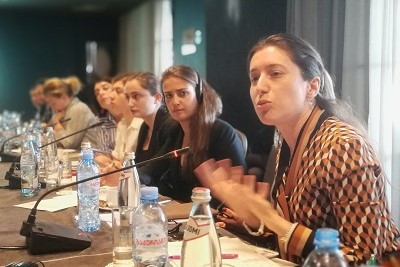Gender Equality Council, government representatives and UN Women discuss gender pay gap and policy implications
Date:
Achieving full and decent employment for all women and men and equal pay for work of equal value are targets defined in the UN Sustainable Development Goals and represent powerful mechanisms for attaining economic prosperity and equality within society.

The gender pay gap in Georgia is a pressing matter - on average, women earn 34.5% less than men according to 2016 data from the National Statistics Office. Although data on the average difference between the nominal salaries of working men and women has been available thus far, more sophisticated data sources and methodological innovations are necessary to gain an in-depth understanding of the gender pay gap and to design appropriate policy solutions. These issues were discussed during a meeting in Tbilisi organized by the Gender Equality Council of the Parliament in partnership with UN Women Georgia.
The participants of the discussion included the Vice Speaker of the Parliament, the Chair of the Gender Equality Council Ms. Tamar Chugoshvili, and representatives of the National Statistics Office, the Ministry of Economy and Sustainable Development, the Ministry of Internally Displaced Persons from the Occupied Territories, Accommodation and Refugees, the Ministry of Labour, Health and Social Affairs, the International Labour Organization and other partners.
Mr. Paata Shavishvili, Deputy Chair of the National Statistics Office, presented the current methodology for analysing the gender pay gap according to aggregate remuneration data based on the Establishments’ Salary Survey. This survey was improved in 2018 and now includes data on the positions of employees. He also noted that in 2017, the Labour Force Survey (LFS) was conducted separately from the Integrated Household Survey and emphasized the importance of obtaining detailed and credible statistics on the gender pay gap. The National Statistics Office highlighted the need for technical support in the gender analysis of the first set of LFS data in 2019 and requested the support of UN Women.
During the discussion on the policy implications, special emphasis was placed on understanding the root causes of the gender pay gap in Georgia, particularly respective legislative changes and social policies. Mr. Dimitri Tskitishvili, Member of Parliament, noted: “We need to progress in many directions, but the social policies are of special importance because in Georgia they are often perceived as charity, not as the means of improving people’s participation in the economy and increasing their contribution.”